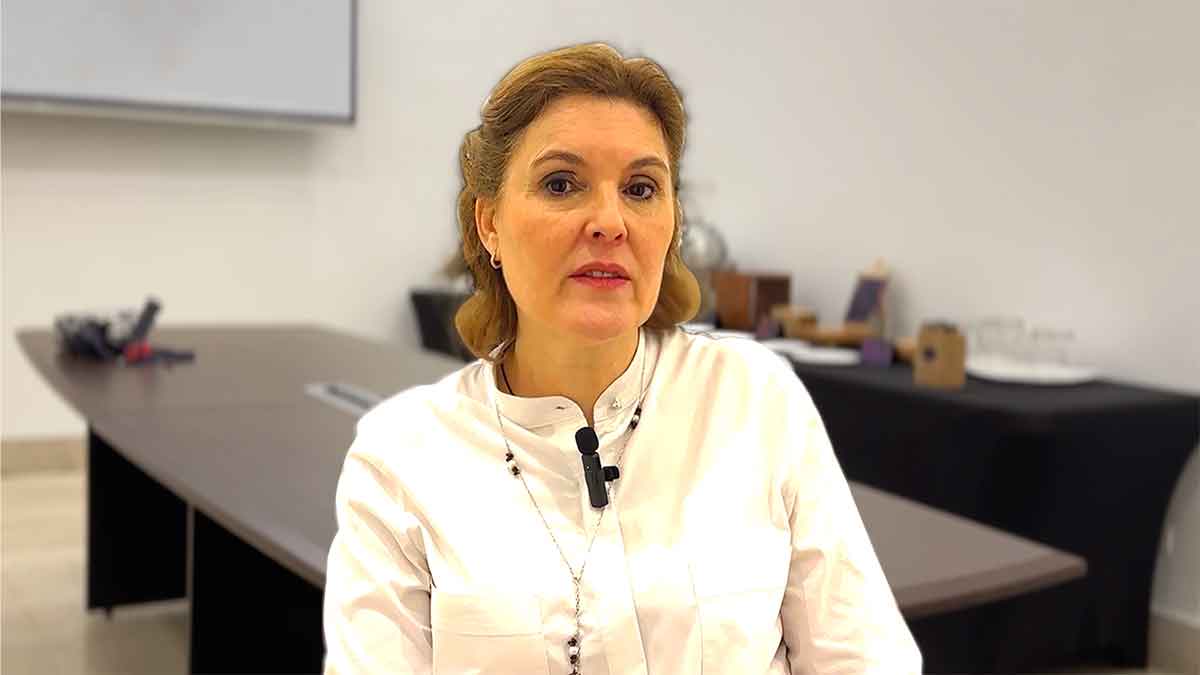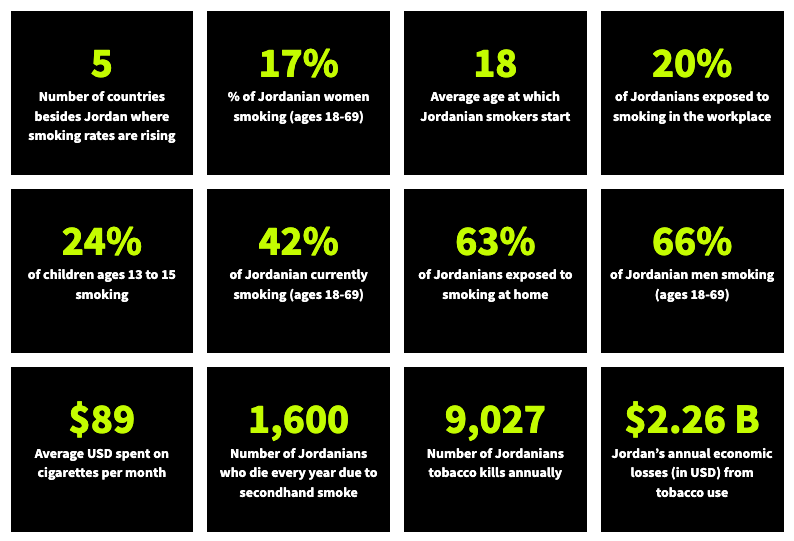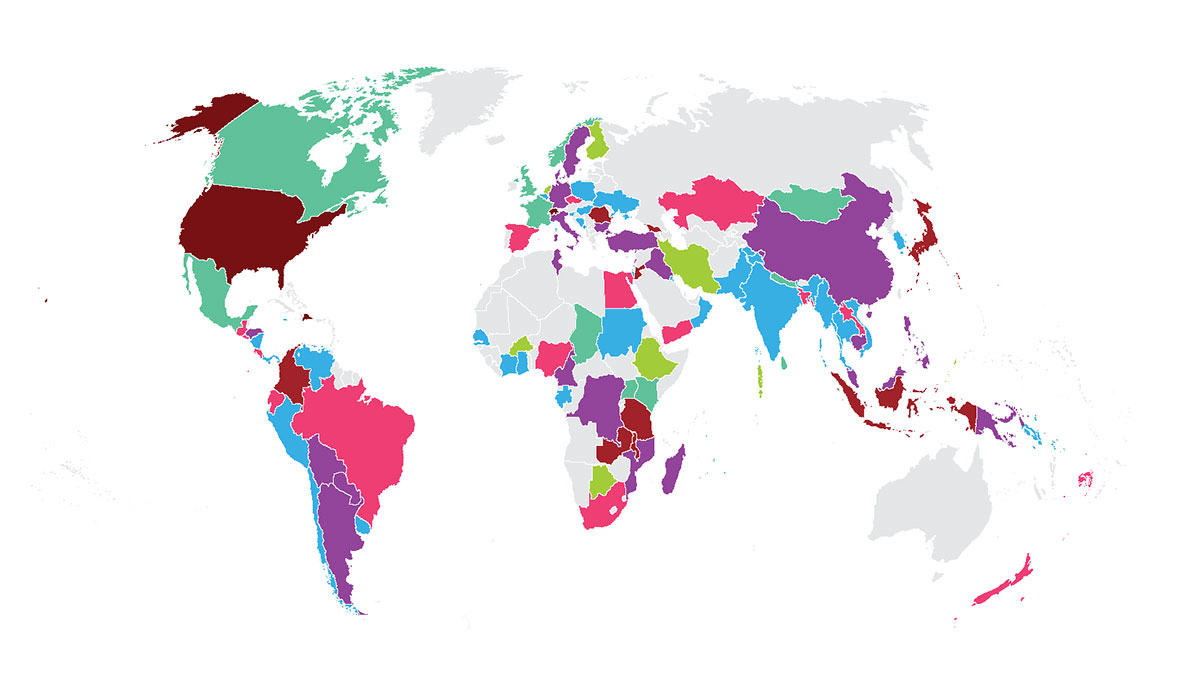- Resources
- News
-
-
Get Email Updates
Sign up for STOP's emails and never miss an update on our latest work and the tobacco industry's activity.
-
Share a Tip
Do you have information on tobacco industry misconduct in your country? Let us know.
-
Get Funding
Ready to tackle industry interference? You could be eligible for a grant.
-
Get Email Updates
Sabotaging Policy
October 23, 2024

Tobacco Free Jordan began when Larissa Al-Uar and another mother found themselves stunned to see a woman smoking cigarettes at a child’s birthday party.
What began as a small group of mothers has evolved into a successful, inclusive, award-winning grassroots tobacco control campaign working to protect all of Jordan’s youth through strong tobacco regulations.
Its mission is critical because Jordan is a young country—54% of its population is under 24—and 1 of 6 nations where smoking is on the rise.
A nation’s future at risk
More than 4 in 10 adults (including 2 in 3 men) in Jordan smoke, while almost a quarter of schoolchildren ages 13-15 have succumbed to the addictive habit. Jordan also has one of the highest rates of secondhand smoke exposure—80% among adults—meaning even citizens who don’t smoke are hurt by tobacco products.
Cigarettes, shisha and electronic cigarettes fuel the epidemic, which threatens Jordan’s future. Jordan’s future is literally the youth. At the rate things are going, Al-Uar describes what could be a grim future for Jordan if coming generations continue to be drawn into tobacco addiction.
“This will impact families. They’re losing the breadwinners,” Al-Uar worries. “What’s next? Who is going to build the country?”

Sources: WHO report, WHO STEPS, UNDP, World Bank
Tobacco regulations work, when enforced
Despite the smoking statistics, Jordan has relatively strong tobacco laws regarding taxes, advertising, corporate social responsibility activities and graphic health warnings. Yet while King Abdullah II recently urged the government to address smoking, Jordan falters in enforcing existing regulations and in keeping the tobacco industry out of policymaking.
The Global Tobacco Industry Interference Index gives Jordan one of its lowest scores. In 2020, the World Health Organization reported the nation experienced some of the world’s highest levels of industry interference and the government had done nothing sufficient to stop it.
“You can’t really put a line where you see them and where you don’t because they’re just everywhere,” Al-Uar says.
Regulations prohibiting tobacco sales around schools are routinely violated, she adds. In stores, tobacco products are placed at children’s eye level, often in packaging resembling ice cream or candy wrappers. Meanwhile, social media influencers market to children, linking tobacco “with the fun and hip lifestyle that all the kids want to experience,” Al-Uar explains.
“I wouldn’t smoke e-cigarettes that (have flavor names like) alien blood or dragon breath,” she says. “I have simply no imagination about what the flavor would be, so it’s marketing to children, not to adults.”
Children are key to Tobacco Free Jordan’s work, which in 2020 helped revive a law banning smoking in public places. Young people appear in its anti-smoking campaigns, and the group has produced a book, cartoons and songs aimed at educating the youth. Its work has earned the attention of 1.2 million Facebook followers as well as recognition from the royal family and a 2020 WHO World No Tobacco Day Award.
Protecting Jordan and beyond
To those looking to replicate her group’s mission, Al-Uar has advice. First, remain knowledgeable. With new products like e-cigarettes, young people may know more than adults, so it’s essential advocates stay on top of trends. It’s important to remember, too, that this is not solely a health issue.
“It’s health. It’s economy. It’s environment. It’s everything. It’s sustainability. So, I think it’s very important to be able to approach the same topic from different angles,” she says.
Finally, when it comes to industry representatives, “just don’t believe them.” This is an industry that told the public nicotine was not addictive and smoking didn’t cause cancer. So why should the public believe the industry when it presents e-cigarettes as supposedly safer alternatives? There’s no telling how the chemicals in e-cigarettes will affect kids years from now, Al-Uar notes.
Every parent should be pondering one thing, she says: “Do we really want our children to be part of this human experiment? I think we need to ask ourselves this question.”




